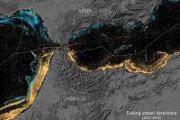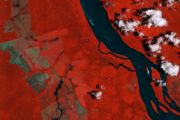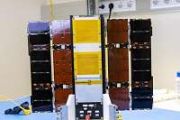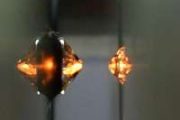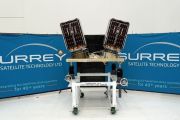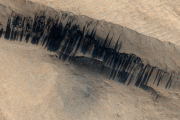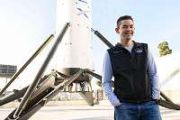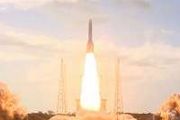
Copernical Team
Ride into microgravity with a 'spy' amongst numerous experiments
 On 21 October 2022 at 09:25, the MAPHEUS 12 research rocket of the German Aerospace Center took off from the Esrange Space Center near Kiruna in northern Sweden. It reached an altitude of 260 kilometres before descending back to Earth on a parachute. On board for the first time were nerve cells. The goal is to understand how their electrical signals deviate in microgravity.
The research te
On 21 October 2022 at 09:25, the MAPHEUS 12 research rocket of the German Aerospace Center took off from the Esrange Space Center near Kiruna in northern Sweden. It reached an altitude of 260 kilometres before descending back to Earth on a parachute. On board for the first time were nerve cells. The goal is to understand how their electrical signals deviate in microgravity.
The research te SpaceX announces Starlink Internet service on airplanes
 SpaceX announced that its satellite internet service Starlink will be available on select airplanes beginning next year.
Starlink Aviation will offer Internet speeds of up to 350 Mbps to each plane that is equipped with its Aero Terminal, which it says is fast enough for video calls, online gaming, "and other high data rate activities."
"With Starlink, passengers will be able to
SpaceX announced that its satellite internet service Starlink will be available on select airplanes beginning next year.
Starlink Aviation will offer Internet speeds of up to 350 Mbps to each plane that is equipped with its Aero Terminal, which it says is fast enough for video calls, online gaming, "and other high data rate activities."
"With Starlink, passengers will be able to The most precise accounting yet of dark energy and dark matter
 Astrophysicists have performed a powerful new analysis that places the most precise limits yet on the composition and evolution of the universe. With this analysis, dubbed Pantheon+, cosmologists find themselves at a crossroads. Pantheon+ convincingly finds that the cosmos is composed of about two-thirds dark energy and one-third matter - mostly in the form of dark matter - and is expanding at a
Astrophysicists have performed a powerful new analysis that places the most precise limits yet on the composition and evolution of the universe. With this analysis, dubbed Pantheon+, cosmologists find themselves at a crossroads. Pantheon+ convincingly finds that the cosmos is composed of about two-thirds dark energy and one-third matter - mostly in the form of dark matter - and is expanding at a Using Webb Telescope to study supernovae as source of heavy elements in universe
 In 1980's popular book "Cosmos," Carl Sagan wrote of what makes us: "All the elements of the Earth except hydrogen and some helium have been cooked by a kind of stellar alchemy billions of years ago in stars, some of which are today inconspicuous white dwarfs on the other side of the Milky Way Galaxy. The nitrogen in our DNA, the calcium in our teeth, the iron in our blood, the carbon in our app
In 1980's popular book "Cosmos," Carl Sagan wrote of what makes us: "All the elements of the Earth except hydrogen and some helium have been cooked by a kind of stellar alchemy billions of years ago in stars, some of which are today inconspicuous white dwarfs on the other side of the Milky Way Galaxy. The nitrogen in our DNA, the calcium in our teeth, the iron in our blood, the carbon in our app 'Marshmallow' world orbiting a cool red dwarf star
 A gas giant exoplanet with the density of a marshmallow has been detected in orbit around a cool red dwarf star by a suite of instruments, including the NASA-funded NEID radial-velocity instrument on the WIYN 3.5-meter Telescope at Kitt Peak National Observatory, a Program of NSF's NOIRLab. The planet, named TOI-3757 b, is the fluffiest gas giant planet ever discovered around this type of star.
A gas giant exoplanet with the density of a marshmallow has been detected in orbit around a cool red dwarf star by a suite of instruments, including the NASA-funded NEID radial-velocity instrument on the WIYN 3.5-meter Telescope at Kitt Peak National Observatory, a Program of NSF's NOIRLab. The planet, named TOI-3757 b, is the fluffiest gas giant planet ever discovered around this type of star. Discovery could dramatically narrow search for space creatures
 An Earth-like planet orbiting an M dwarf - the most common type of star in the universe - appears to have no atmosphere at all. This discovery could cause a major shift in the search for life on other planets. Because M-dwarfs are so ubiquitous, this discovery means a large number of planets orbiting these stars may also lack atmospheres and therefore are unlikely to harbor living things.
An Earth-like planet orbiting an M dwarf - the most common type of star in the universe - appears to have no atmosphere at all. This discovery could cause a major shift in the search for life on other planets. Because M-dwarfs are so ubiquitous, this discovery means a large number of planets orbiting these stars may also lack atmospheres and therefore are unlikely to harbor living things. Driving on the Sidewalk, MARDI-Style: Sols 3630-3632
 We continue our drive through "Marker Band valley", an area of high interest scientifically, due to strong evidence of sulfates from orbital mapping. In this area, the sulfates are typically magnesium rich (think Epsom salts!), with less evidence for the more common calcium rich sulfates we have been traversing across for over ten years.
We found some lovely bedrock in our workspace this m
We continue our drive through "Marker Band valley", an area of high interest scientifically, due to strong evidence of sulfates from orbital mapping. In this area, the sulfates are typically magnesium rich (think Epsom salts!), with less evidence for the more common calcium rich sulfates we have been traversing across for over ten years.
We found some lovely bedrock in our workspace this m Gilmour Space offers tech demo satellite mission from Australia in 2024
 Australian rocket and satellite builder, Gilmour Space Technologies, is offering a new rideshare mission into Low Earth Orbit - this time, on one of its G-class satellite buses (or G-Sat) scheduled to be launched in late 2024.
"We're calling this our Kangaroo-1 mission, and it will be capable of carrying 125U (or 125 units) of payload volume into a mid-inclination orbit," said Shaun Kenyon
Australian rocket and satellite builder, Gilmour Space Technologies, is offering a new rideshare mission into Low Earth Orbit - this time, on one of its G-class satellite buses (or G-Sat) scheduled to be launched in late 2024.
"We're calling this our Kangaroo-1 mission, and it will be capable of carrying 125U (or 125 units) of payload volume into a mid-inclination orbit," said Shaun Kenyon Spacecraft manufacturer Apex emerges from stealth with $7.5M in funding
 Apex, the Los Angeles-based spacecraft manufacturing company, emerged from stealth Monday with over $7.5M in funding.
As the cost to launch satellites and spacecraft to orbit has declined drastically over the last several years, an exponentially increasing number of new commercial and government payloads have entered operation.
These payloads, which range from earth observation camer
Apex, the Los Angeles-based spacecraft manufacturing company, emerged from stealth Monday with over $7.5M in funding.
As the cost to launch satellites and spacecraft to orbit has declined drastically over the last several years, an exponentially increasing number of new commercial and government payloads have entered operation.
These payloads, which range from earth observation camer Planet launches nonprofit program to drive more access to timely, global satellite data
 Planet Labs PBC (NYSE: PL)reports the launch of its Nonprofit Program, an offering that provides access to Planet imagery and support services specifically for nonprofits and non-governmental organizations (NGOS).
In line with Planet's mission to use space to help life on Earth and in effort to enable more impactful uses of Planet's data, the offering addresses two traditional challenges f
Planet Labs PBC (NYSE: PL)reports the launch of its Nonprofit Program, an offering that provides access to Planet imagery and support services specifically for nonprofits and non-governmental organizations (NGOS).
In line with Planet's mission to use space to help life on Earth and in effort to enable more impactful uses of Planet's data, the offering addresses two traditional challenges f 










